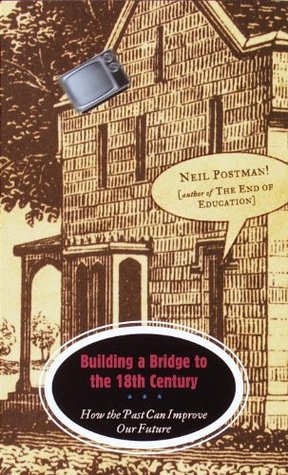More on this book
Kindle Notes & Highlights
by
Neil Postman
Started reading
December 18, 2018
Among Marshall McLuhan’s many intriguing metaphors, the most paradoxical one is his reference to “rearview mirror” thinking.
Read The Road Ahead by Bill Gates, and you will see it is more history than prophecy,
Imagined futures are always more about where we have been than where we are going.
he invites us to be quite careful about what part of the past we use in imagining the future.
many of your potential readers believe in deal-making devils.
those who have fallen under the devilish spell of what is vaguely called “postmodernism,”
strange and fanciful dreams that seem always to accompany the onset of a new millennium.
the confusion that accompanies the absence of a narrative to give organization and meaning to our world—
we require a story to explain to ourselves why we are here and what our future is to be,
when people do not have a satisfactory narrative to generate a sense of purpose and continuity, a kind of psychic disorientation takes hold,
they have found a story that will keep them going for a while, but not for long.
I write for those who are still searching for a way to confront the future,
In some parts of the Islamic world the commandments of Muhammad are, in fact, taken as imperatives of everyday life.
cloning of human beings will become a reality. I think we can say that we have here a genuine twenty-first-century problem.
Where will we go for guidance?
There is nothing new in human beings’ defining other human beings as non-human things.
humans will become merely pets of their computers, so that the definition of the worth and capacity of humans will change.
in order to have an agreeable encounter with the twenty-first century, we will have to take into it some good ideas.
I am suspicious of people who want us to be forward-looking.
There is nothing yet to see in the future.
Is it not obvious that our century has been an almost unrelieved horror?
I speak as an enemy of this century.
Plato, was the world’s first systematic fascist.
Medieval theologians developed an elaborate and systematic description of our relationship to God, to nature, to each other, and to our tools.
Theology, not technology, provided people with authorization for what to do and think.
in the theocratic world-view, technology was not autonomous but was subject to the jurisdiction of a binding religious system.
In a technological world, and in a multicultural world, fundamentalism is a side issue, confined to those places that are still theocratic and are therefore regarded as a danger to world harmony.
Clearly, Postman did not foresee a world in which radical outliers and fundamentalists could have their voices amplified to such a degree, and the marginalized could become mainstream.
Where shall we look for guidance about what to do and think in the twenty-first century, especially guidance about our relationship to technology?—
ideas that we can carry with confidence and dignity across the bridge to the twenty-first century.
urged his fellow countrymen and -women to pay attention to America the way I would urge we pay attention to the eighteenth century.
Let us look there for instruction rather than models.
It was in the eighteenth century that reason began its triumph over superstition.
conceived of the universe as orderly, rational, and comprehensible.
And so the eighteenth century is a kind of metaphor referring to the time, as Kant put it, when we achieved our release from our self-imposed tutelage.
will try to show how some of the ideas of the eighteenth century may be useful to us.
In Italy, the tortures of the Inquisition continued until the end of the century.
Rousseau, who gave us the idea that children must have a childhood.
When we speak of “Romanticism,” we speak of a rejection of the presumptions of rationalism,
(as did, by the way, Hegel in his Life of Jesus).
rationalism was essentially a revolt against orthodoxy,
resulting in the gradual erosion of the divine right of kings and the unlimited authority of monarchs.
the Enlightenment produced two great republics—the United States and France. And more would follow.
by 1700 the natural sciences had reached a stage which made Newton’s synthesis possible.
Reliable knowledge was to be the arsenal of reason, and reason would be the force which led to rational change.
people have not always thought that progress was a fact, natural or otherwise.


